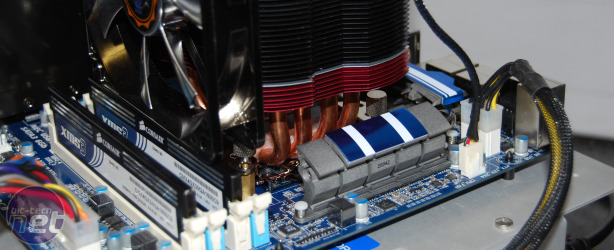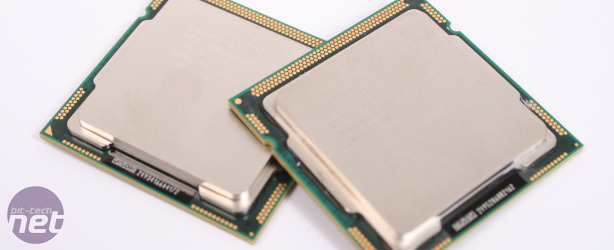Results Analysis
Not everyone is interested in overclocking their rig, so we ran the three CPUs through our range of benchmarks at stock speed before we started handing out the extra vcore. One note we need to make with our stock results was that while we ran our memory at 1,600MHz with the X6 1055T and i5-655K, we could only use a frequency of 1,333MHz with the i5-750, due to the on board memory controller not supporting a 12x memory strap.At stock speeds, the i5-655K fared poorly in the heavily multi-threaded elements of our test suite. It was the slowest CPU in Cinebench and WPrime, where the extra cores of the i5-750 and X6 1055T excelled - the i5-655K was almost six seconds slower than the 6-core AMD chip in WPrime and more than 8,500 points behind in Cinebench.
In the tests that are more dependent on instructions per clock (IPC) rather than the number of CPU cores, such as our test games, Intel's new CPU showed more promise. The i5-655K returned a solid minimum frame rate of 24fps in Crysis, which was marginally faster than the X6 1055T, but slower than the i5-750.

The i5-655K got pretty warm at 4.6GHz so you will need a large cooler, such as the Titan Fenrir we used, to keep things stable. Click to enlarge.
Our Media Benchmarks followed a similar pattern, with the i5-655K sneaking ahead of the X6 1055T with an overall score of 1,372 as opposed to 1,301. The i5-750 remained king of the application performance hill, though, achieving a strong overall score of 1,483. It's worth noting that in the image editing test, where single-threaded performance is a key factor, the i5-650 came out on top, thanks to its 3.2GHz clock speed as opposed to the more mundane 2.66GHz cores of the i5-750.
As well as overclocking the i5-655K from 3.2GHz to 4.6GHz, we overclocked the X6 1055T from 2.8GHz to 4.05GHz and the i5-750 from 2.66GHz to 4GHz. The X6 1055T came out on top in the heavily multi-threaded tests, taking 8.299 seconds in the WPrime test and achieving over 23,000 points in Cinebench. The i5-655K posted the slowest scores in these tests - due to its dual-core design, but we expected this result.
The i5-655K shone in our games testing, though, leaping ahead of the i5-750 to return the highest minimum and average frame rates of the three CPUs tested. The Crysis results were particularly impressive, with a 46 per cent boost in minimum frame rates, from 25fps to 35fps.
The Media Benchmarks showed the overclocked i5-655K to be the fastest of the three CPUs on test in the image editing test, and not overly slow in the video encoding test either - the score of 2,525 is 19 points higher than the score of the 6-core X6 1055T, which is an incredible result.

Check back next week to see how the i5-655K's bigger brother, the i7-875K, fared when we put it through its paces. Click to enlarge.
Conclusion
You could argue that the unlocked multiplier allows for better overclocks on motherboards that can't hit a 200MHz Base Clock (cheap boards, in other words), but whether you overclock via the Base Clock or the CPU multiplier, you'll still have to add extra CPU voltage. A cheap motherboard may not be able to manage this, with cheap VRMs either limiting the voltage on offer or blowing up after a few hours of load.This is a problem for the i5-655K as its unlocked multiplier is the only advantage it has over the cheaper i5-650.
The strength of this argument is further eroded by the fact that rather than buying the £179 i5-655K and a cheap motherboard, you could buy an i5-750 and use the £20 saved to buy a better motherboard. The i5-750 is also a true quad-core, which helps in multithreaded tasks and when multitasking.
Even if video encoding and multitasking aren’t important to you, you would still be better served by buying the i5-650 over the i5-655, as any reasonable board will be able to overclock the chip to its limit thanks to its high multiplier. Consequently we're finding it difficult to see why Intel released the i5-655K, as it seems to have better options already in its portfolio.
We're tempted to think that the i5-655K could be one for system builders and sellers. Its unlocked multiplier allows the application of a quick, easy, cheap pre overclock to a system which can then be sold at a premium. Considering the strong showing of the i5-750 in almost every situation, and the fact that it's much cheaper than the i5-655K and costs only £5 more than the X6 1055T, the Core i5-750 is still our first choice for a mid-range CPU.
- Performance
- x
- x
- x
- x
- x
- x
- x
- x
- -
- -
- 8/10
- Value
- x
- x
- x
- x
- x
- x
- -
- -
- -
- -
- 6/10
- Overall
- x
- x
- x
- x
- x
- x
- x
- -
- -
- -
- 7/10
Score Guide

MSI MPG Velox 100R Chassis Review
October 14 2021 | 15:04










Want to comment? Please log in.